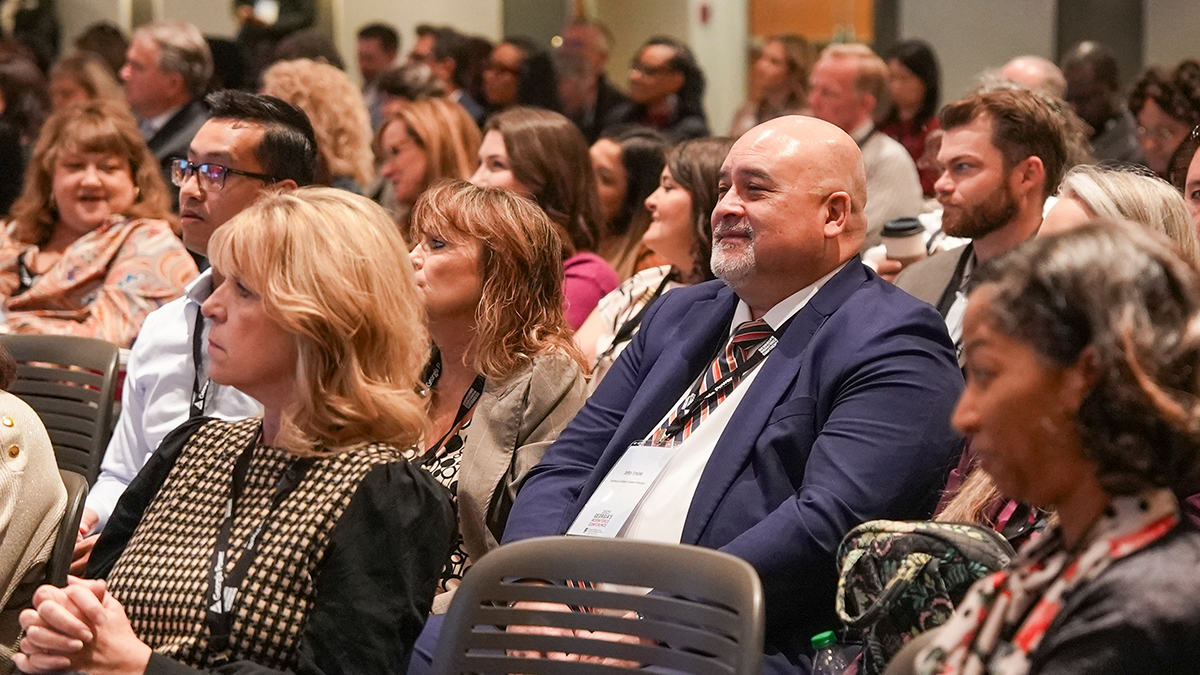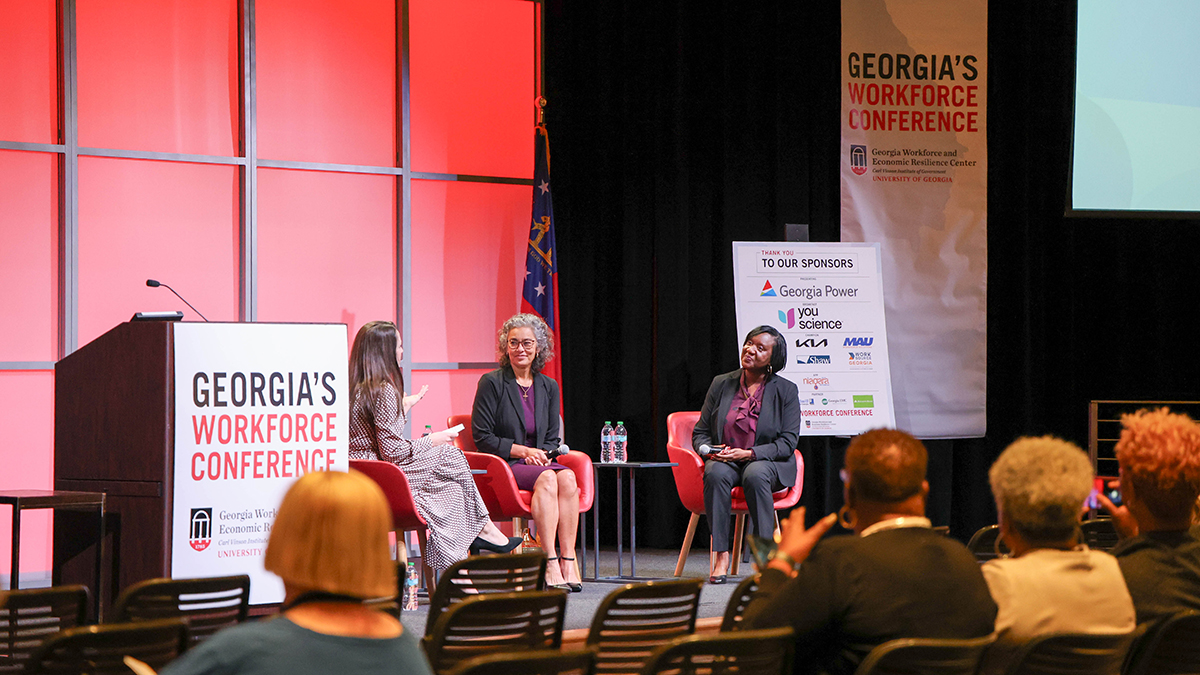Fifth annual event brings together educators, industry leaders
and others to explore workforce development strategies
Georgia is known as the No. 1 state for business, and a new initiative aims to build its reputation as a top state for talent as well, according to speakers at the fifth annual Georgia’s Workforce Conference.
The University of Georgia Carl Vinson Institute of Government hosted the sold-out conference Nov. 18-19 in Athens, where more than 350 people gathered to learn about innovative strategies and programs Georgia companies, communities and organizations are using to address talent development needs and build long-term workforce pipelines.
One way Georgia is addressing workforce needs is with the Top State for Talent initiative. A panel discussion featured Georgia Department of Education Deputy Superintendent Barbara Wall, Technical College of Georgia Chief of Staff Mark Peavy and Governor’s Education and Workforce Strategy Team member Miki Edwards talking about the initiative, which was officially launched by the General Assembly and Governor’s Office this summer with the Top State for Talent Act.
The Top State for Talent initiative was developed to align education, training and economic priorities to change how Georgians prepare for and access meaningful careers. Key parts of the initiative include state and regional High-Demand Careers Lists and the Georgia MATCH program, which attempts to simplify the college search process by providing high school students with a list of Georgia colleges where they would be eligible for admission.
The economy is another component of workforce development. David Altig, executive vice president and chief economic advisor at the Federal Reserve Bank of Atlanta, shared an analysis of current economic conditions and their implications for workforce and community development. The economy has gradually slowed over the past year, Altig said. He pointed to the need for adaptable workforce strategies to increase productivity gains and resilience in the workforce.

J.J. Irvine of the Technical College System of Georgia listens intently during a presentation at the 2025 Georgia's Workforce Conference. (Photo by Sara Ingram) |
Georgia Department of Economic Development Commissioner Pat Wilson highlighted the state’s latest achievements in business growth and investment and emphasized the importance of partnerships for continued economic success.
Wilson said Georgia’s pro-business climate, logistical capacity for global product distribution and creative workforce solutions make the state attractive for company recruitment. Educational partners, from K-12 schools to the Technical College System and the University System of Georgia, play key roles in preparing future employees for success. That point was underlined by Stacy Jones, vice president for UGA Public Service and Outreach.
“At the University of Georgia, we know Georgia—and we know that workforce development is the lifeblood of communities across the state,” said Jones. “It is integrated into our teaching, research and service, both to train the workforce of tomorrow and to help communities grow and attract a healthy workforce today.”
Twenty breakout sessions covered a wide range of topics, including the role of K-12 schools in workforce development, advanced manufacturing opportunities and housing as a strategic tool for economic growth.
Attendees said the conference helped build professional connections and inspired new ideas.
“It’s important to understand the trends and shifts that are taking place and to ensure that our efforts are aligned to support workforce development,” said Marcus Early, Central Georgia Technical College satellite operations director. “I’m excited about what this conference has to offer.”
Institute of Government faculty Rebecca Hunt presented the 2025 Georgia Workforce Pipeline Snapshot, an annual report on the state’s economy, labor force and education. Childcare availability and housing affordability are issues for Georgia’s workers, Hunt noted, pointing to statistics that showed 29% of workers cut their work hours and 21% of workers left their jobs altogether when childcare wasn’t available.

Rebecca Hunt, UGA Institute of Government faculty, discusses recruitment and retention with Melenie Choto of Chick-fil-A and Melissa Speight for Starbucks during a plenary session at the 2025 Georgia's Workforce Conference. (Photo by Cameron Pearce) |
Georgia Labor Commissioner Bárbara Rivera Holmes closed the conference by sharing the Department of Labor’s efforts to support one of Georgia’s strongest economic assets—its people. Georgia counted $26 billion in new investments and more than 23,000 new jobs last year. Nearly 80% of that growth happened outside metro Atlanta, she said.
“The state has earned its title as the top state for business for many reasons, but none more important than the dedication of Georgians who rise every day to work, to build and to make our state stronger,” she said.
Conference sponsors included Georgia Power, YouScience, Amazon, Kia, Shaw Industries, Georgia Realtors, MAU Workforce Solutions and Worksource Georgia. Additional support was provided by Niagara Bottling LLC, Atlanta Electrical Contractors Association, Georgia EMC, Goodwill of North Georgia and Regions Bank.
Georgia’s Workforce Conference is an initiative of the institute’s Georgia Workforce and Economic Resilience Center, a hub of programs and services designed to support continued economic and workforce competitiveness.
“The continued growth and recognition of Georgia’s Workforce Conference show UGA’s commitment to convening our state’s leaders in education, industry and workforce to build a strong, sustainable talent pipeline for Georgia’s future,” said Institute of Government Director Rob Gordon. “Our Institute of Government team brings expertise and resources to the table, helping our partners find innovative solutions to workforce development challenges across the state.”
Next year’s event will be held Nov. 10-11, 2026, at the UGA Center for Continuing Education & Hotel in Athens. To learn more about workforce-related events and initiatives, visit Georgia Workforce and Economic Resilience Center online.
